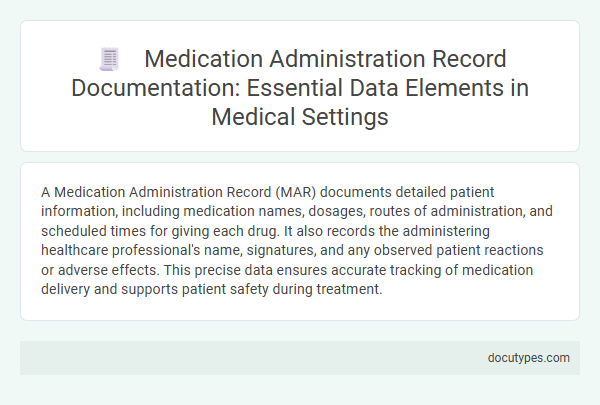A Medication Administration Record (MAR) documents detailed patient information, including medication names, dosages, routes of administration, and scheduled times for giving each drug. It also records the administering healthcare professional's name, signatures, and any observed patient reactions or adverse effects. This precise data ensures accurate tracking of medication delivery and supports patient safety during treatment.
Introduction to Medication Administration Records (MARs)
Medication Administration Records (MARs) serve as essential tools for tracking and documenting all medication-related activities within healthcare settings. Your accurate documentation in these records helps ensure safe and effective patient care.
- Patient Information - Details such as patient name, date of birth, and identification number are recorded to ensure medication accuracy.
- Medication Details - The name, dosage, route, and schedule of each administered medication are documented to track treatment precisely.
- Administration Times and Signatures - The exact time of medication administration along with the healthcare provider's signature or initials are noted for accountability.
Importance of Accurate MAR Documentation
A Medication Administration Record (MAR) documents critical patient information including medication names, dosages, administration times, routes, and the healthcare professional responsible for administering the drugs. Precise documentation of allergies, patient reactions, and any missed doses is also essential for patient safety and effective treatment.
Accurate MAR documentation ensures continuity of care, reduces medication errors, and supports clinical decision-making. It serves as a legal record and a vital communication tool among healthcare providers to maintain patient safety and optimize therapeutic outcomes.
Core Data Elements in MARs
| Core Data Elements in a Medication Administration Record (MAR) | Description |
|---|---|
| Patient Information | Full name, date of birth, medical record number, and allergies to ensure accurate identification and safety during medication administration. |
| Medication Details | Name of the medication, dosage, route of administration (e.g., oral, intravenous), and frequency prescribed to maintain correct medication management. |
| Administration Date and Time | Exact date and time each dose is administered to track adherence and prevent missed or duplicate doses. |
| Administrator's Information | Name or initials of the healthcare professional administering the medication, ensuring accountability and traceability. |
| Special Instructions | Any specific directions related to the medication, such as withholding criteria or pre-administration assessments, to improve safety. |
| Patient's Response | Documentation of observed effects or adverse reactions following administration, critical for ongoing treatment evaluation. |
| Signature or Electronic Verification | Authentication confirming the accuracy and completion of the medication administration entry, supporting legal and clinical standards. |
| Prescription Details | Prescriber's name, date of prescription, and authorization details to validate and cross-check medication orders. |
Understanding these core data elements in your MAR can enhance safe medication practices and support effective healthcare communication.
Patient Identification Information
A Medication Administration Record (MAR) includes essential patient identification information such as the patient's full name, date of birth, and medical record number. This data ensures accurate matching of medications to the correct individual, minimizing risks of medication errors. Accurate patient identification supports safe and effective medication administration in clinical settings.
Medication Details and Dosage Specifications
The Medication Administration Record (MAR) meticulously documents medication details including the drug name, formulation, and manufacturer to ensure precise identification. This data supports safe medication practices by preventing errors and facilitating audits.
Dosage specifications recorded in the MAR encompass the exact dose, route of administration, frequency, and timing. Recording these parameters guarantees accurate delivery aligned with the prescribed regimen. Such documentation plays a crucial role in monitoring patient response and adjusting treatment plans effectively.
Documentation of Administration Time and Route
What specific data is documented in a Medication Administration Record regarding administration time and route?
The Medication Administration Record (MAR) precisely logs the exact time a medication is given to ensure accurate dosing intervals. It also records the route of administration, such as oral, intravenous, or intramuscular, to guarantee the correct delivery method is followed. Your careful documentation helps maintain patient safety and treatment effectiveness.
Recording Adverse Drug Reactions and Allergies
The Medication Administration Record (MAR) meticulously documents patient-specific adverse drug reactions (ADRs) and known allergies to prevent clinical complications. Detailed entries include the type of reaction, onset time, severity, and any interventions taken to manage the ADR. Accurate recording of allergies and drug sensitivities ensures safe medication administration and informs healthcare providers during prescribing decisions.
Role of Healthcare Providers in MAR Entry
The Medication Administration Record (MAR) contains detailed documentation of medication specifics, including drug names, dosages, and administration times. The accurate entry of this data is crucial for patient safety and effective treatment management.
- Medication Details - Healthcare providers record the drug name, dosage, route, and frequency to ensure precise treatment.
- Administration Times - Exact times of medication delivery are noted to track adherence and avoid missed doses.
- Provider Identification - The name or initials of the healthcare professional who administered the medication are documented for accountability.
Your role as a healthcare provider involves careful and timely documentation in the MAR to maintain an accurate medication history.
Compliance, Legal, and Regulatory Considerations
Medication Administration Records (MARs) capture detailed data essential for ensuring compliance with healthcare regulations. These records support legal accountability and adherence to regulatory standards in medication management.
- Patient Identification Information - Accurate documentation of patient details prevents errors and supports legal verification processes.
- Medication Details - Recording drug names, dosages, and administration times ensures regulatory compliance and traceability.
- Administrator Credentials and Signatures - Inclusion of healthcare provider signatures establishes accountability and meets legal documentation requirements.
What Specific Data Is Documented in a Medication Administration Record? Infographic

